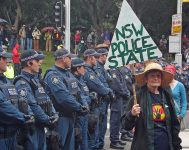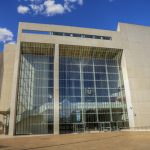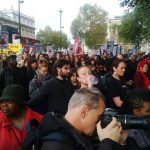NSW Police Use Anti-Protest Laws to Monitor Tour Groups

Over a weekend in February, a tour group visiting areas threatened by mining in the Upper Hunter was placed under NSW police surveillance. This apparently unwarranted monitoring – reminiscent of totalitarian regimes like North Korea – seems to be yet another attempt to suppress potential dissent under the Coalition’s anti-protest regime.
The Lock the Gate tour comprised city-based residents visiting communities and areas impacted by the Hunter coal-mining industry. The promotional material for the tour lists a series of meetings with local residents. And there’s no mention of any plans to protest.
However, NSW police took it upon themselves to label the tour a ‘protest group’ and actively monitor its movements. Convoys of up to four police vehicles were shadowing tour participants for hours on end on both February 3 and 4.
The use of the laws shines a light on the state government’s interests, particularly its pro-mining stance, which is effectively putting residents of, and visitors to, areas that are heavily owned by multinational mining corporations at risk of targeting and even criminal prosecution.
Occupied territory
Lock the Gate spokesperson Steve Phillips recalls that the tour first encountered police in Wollar in the far Upper Hunter. “Police vehicles began frequently driving by our tour group, and then a convoy of police vehicles appeared to follow our tour bus as we left Wollar,” he said.
As the group made their way to a nature reserve area in Ulan, known as the Drip, officers followed. “About half a dozen police vehicles, including a police rescue outfit, followed us into the parking lot at the Drip and stayed there for over an hour observing our tour group,” Phillips continued.
The tour organiser said Mudgee police inspector Jeff Boon approached him and asked what the group were up to. “I told him we were hosting an information tour and observed that there was really no reason for the police to be there,” Mr Phillips told Sydney Criminal Lawyers®.
“Nevertheless, the police were waiting for us at our next stop, Bylong,” he added.
NSW police has since stated that it’s appropriate to monitor the “actions of protest groups during planned events.” However, it gave no evidence as to why they labelled those on tour as a protest group.
Far from reasonable
NSW Council for Civil Liberties vice president Pauline Wright said that “lawful protest is a right that we have as a democracy.” And even though “there are certain restrictions,” in this case, there was nothing to warrant police having a “reasonable suspicion that there would be any unlawful protest.”
“People should be free to go about lawful activities – like being part of a guided tour – without being subject to police surveillance,” Ms Wright outlined. And she questioned why police resources weren’t being directed towards serious crime, rather than “normal, lawful business.”
According to Ms Wright, there’s no doubt the new anti-protest laws were behind what the police saw “as a reasonable apprehension that a crime might be about to be committed.” And she added that these laws have implications for “people’s ability to have freedom of political communication.”
Silencing dissent
Back in 2014, then NSW premier Mike Baird told a NSW mining industry dinner that his government was going to “crackdown” on those who choose to break the law when they protest. And he singled out “protesters who unlawfully enter mining sites.”
A little over a year later, the Coalition government followed through with the premier’s promise when it passed a series of harsh anti-protest laws, under the Inclosed Lands, Crimes and Law Enforcement Legislation Amendment (Interference) Bill 2016.
The legislation created the new offence of aggravated unlawful entry on inclosed lands. Section 4B of the Inclosed Land Protection Act 1901 provides that interfering, or attempts to interfere, with the conduct of a business on enclosed land can land a protester with a fine of up to $5,500.
Under the provisions of the bill, police were provided with additional powers to stop, search, detain, and seize the property of protesters, as well as being given the power to shutdown a peaceful protest if it is obstructing traffic.
And the bill also inserted a definition of mine into section 201 of the Crimes Act 1900, so that the offence of interfering with a mine includes coal seam gas exploration and extraction sites. This offence carries a maximum penalty of seven years imprisonment.
The Wilpinjong Three
Bev Smiles, Bruce Hughes and Stephanie Luce are the first people to be up on protesting charges since the laws were changed. In April last year, the three were arrested for protesting outside the Wilpinjong coal mine in Wollar.
The three are up on charges of rendering a road belonging to a mine useless and hindering the working equipment belonging to a mine. These are both offences that carry the penalty of seven years imprisonment.
When the trio appeared at Mudgee Local Court on February 9, the presiding magistrate rejected police claims that the Wollar-Ulan Road, where the defendants were arrested, actually belonged to the mining company.
“They have pleaded not guilty, and are awaiting a judgment on the case,” Mr Phillips explained. “The outcome of that case will be important.” If the three have “the book thrown at them” then it’s likely to discourage the protesting of coal mines in NSW.
An unconstitutional clampdown
And Ms Wright also warns of the stifling effect that the new anti-protest laws are likely to have upon demonstrations. “People are right to be concerned,” Ms Wright told Sydney Criminal Lawyers®. The laws “will have an impact on their decisions as to whether they are going to protest or not.”
The solicitor pointed to last year’s High Court of Australia decision that found parts of the 2014 Tasmanian anti-protest laws were unconstitutional in terms of breaching freedom of political communication. And she added this decision could have implications for the NSW laws.
This attempt to silence protest is something that all citizens should be worried about, Ms Wright concluded. “If we don’t feel that we can stand up and say that we are concerned about an activity… for fear of being charged with a criminal offence for doing so, that is going to have a chilling effect.”








